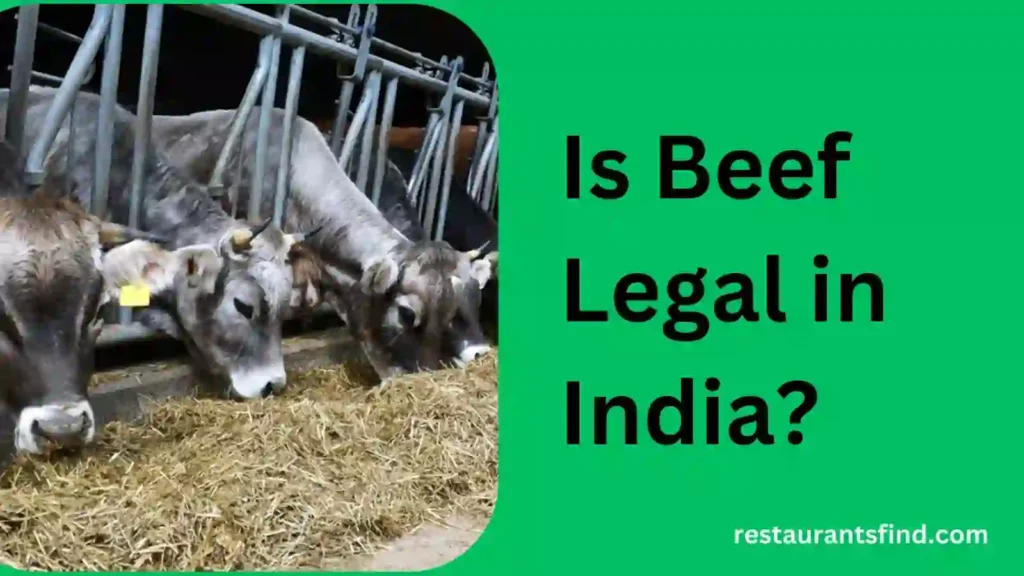India is a country with varied cultures and religions, and this diversity extends to dietary habits as well. While vegetarianism is widespread, meat consumption is also prevalent in some areas of the country.
However, when its come to beef consumption in India is a topic that involves a complex interplay of cultural, religious, and legal factors.

The legality and social acceptance of beef varies widely by location, largely due to cows’ strong religious and cultural significance in Hinduism.
Understanding the legal status of beef in India requires an exploration of these cultural sensitivities and the resulting legislative landscape.
This article will look at the complications of beef legality in India, including the reasons for limitations and differences across different states.
Is Beef Legal in India?
Is Beef Legal in India? There isn’t a simple yes or no answer to this question. In India, food laws are determined by individual states, so the legality of beef varies significantly from place to place.
Generally, over 70% of Indian states restrict the slaughter of cows due to their sacred status in Hinduism. However, the meat of buffaloes, not considered sacred, is legal for consumption in many parts of the country.
This buffalo meat industry plays a significant role in the economy. Additionally, some states allow cow slaughter under specific circumstances, like for export or religious purposes of certain communities.
Why is Cow Slaughter Banned in Some Indian States?
The legality of beef consumption in India is closely related to Hinduism’s great religious and cultural respect for cows. Here’s a closer look at the reasons why some Indian states have banned cow slaughter:
Religious Significance:
- Sacred Symbol: Cows are revered as a symbol of life, motherhood, and the earth itself. They are associated with several Hindu deities:
- Lord Krishna: Often depicted as a cowherd, symbolizing his compassion and care for all living beings.
- Kamadhenu: A mythical wish-fulfilling cow, representing abundance and prosperity.
- Non-Violence (ahimsa): A core principle in Hinduism, cow slaughter directly contradicts the idea of non-violence towards all creatures.
Cultural Importance:
- Source of Sustenance: Cows have historically been essential for Indian agriculture. They provide milk, dung for fertilizer, and bullocks for plowing fields.
- Symbol of Prosperity: Owning cows signifies wealth and self-sufficiency, especially in rural areas.
- Respect for Life: The concept of ahimsa extends beyond religious belief. Cows are seen as gentle creatures deserving of respect and protection.
These religious and cultural beliefs have led to a strong social taboo against cow slaughter and beef consumption in many parts of India. States with a higher Hindu population are more likely to have stricter laws protecting cows.
However, it’s important to remember that India is a secular country with a rich tapestry of religions and cultures.
- Secularism and Regional Diversity: Despite the prevalence of Hinduism, India’s constitution upholds secularism, ensuring equal respect for all religions. This is reflected in the variation of beef laws across states.
- No Ban in Some States: Several states, particularly in the south and northeast, have no cow slaughter or beef consumption restrictions. These regions may have a stronger presence of other religions or historically different cultural practices.
- Respectful Coexistence: Even in states with restrictions, people of various faiths coexist peacefully. While Hindus may avoid beef due to their beliefs, they might not object to others consuming it.
Beef Banned States in India
The laws around cow slaughter and beef consumption differ across India. Here’s a breakdown of states with restrictions, categorized by region:
North India:
- Cow Slaughter Not Allowed: Delhi, Haryana, Himachal Pradesh, Jammu and Kashmir, Punjab, Rajasthan, Uttarakhand
West India:
- Cow Slaughter Not Allowed: Gujarat
Central India:
- Cow Slaughter Not Allowed: Madhya Pradesh
East India:
- Some Restrictions: Assam (only cows over 14 years old), Jharkhand, Odisha, West Bengal (only cows over 10 years old)
South India:
- No Restrictions: Andhra Pradesh, Karnataka, Kerala, Telangana, Tamil Nadu
Northeast India:
- No Restrictions: Arunachal Pradesh, Meghalaya, Mizoram, Nagaland, Sikkim, Tripura
Important Note: This list may not include all details, and laws can change. It’s always best to check the specific regulations of the state you’re interested in.
Additional Information:
- States listed as “Cow Slaughter Not Allowed” typically prohibit slaughtering cows and their offspring, including bulls and bullocks of all ages.
- Some states with “Some Restrictions” might allow cow slaughter under specific circumstances, like if the cow is old, sick, or unable to reproduce.
- Even in states without bans, there might be local restrictions due to religious or cultural reasons.
Punishment for Cow Slaughter or Beef Possession (by State)
Punishments for violating cow slaughter laws vary greatly across India. This is a general overview, and it’s crucial to check the specific laws of the state you’re interested in.
Range of Punishments
- Fines: Fines can range from a few thousand rupees to several lakhs (hundreds of thousands).
- Imprisonment: Sentences can vary widely, from a few months to life imprisonment depending on the severity of the offense (e.g., slaughter vs. possession).
- Confiscation: Vehicles used for illegal transportation of cows may be confiscated.
Key Distinction
Some states only penalize the act of slaughter, not the possession or consumption of beef.
The punishments for violating cow slaughter laws differ from state to state. In some states, the penalties can be quite severe, including substantial fines and imprisonment.
Here are some examples to illustrate the variations:
- Uttar Pradesh: Up to 10 years of imprisonment and hefty fines.
- Maharashtra: Imprisonment up to 5 years and/or fines.
- Gujarat: Life imprisonment for cow slaughter.
Important Notes
- Strict penalties: States like Gujarat and Rajasthan have very harsh punishments, potentially including life imprisonment for cow slaughter.
- Moderate penalties: Other states might have imprisonment terms of a few years and significant fines.
- No penalty for possession: Even in states with slaughter bans, there might not be a penalty for simply possessing or consuming beef.
It’s important to note that while some states strictly penalize slaughter, others may also impose penalties for possession or sale of beef.
Exceptions for Export or Religious Purposes
While most states with cow slaughter bans have a blanket prohibition, some exceptions might exist:
- Export: A few states may allow cow slaughter under specific conditions, such as for export purposes to countries where beef consumption is legal.
- Religious Purposes: Certain religious communities in India might have exemptions for cow slaughter for religious festivals or rituals. However, these exemptions are usually very specific and require permits.
It’s important to note that these exceptions are not universal and vary by state. Always check the specific regulations for any exemptions.
The Debate on Cow Slaughter Bans
The issue of cow slaughter bans in India is a complex and ongoing debate. Here’s a glimpse into the arguments on both sides:
Arguments for Bans:
- Religious and Cultural Significance: Supporters of the bans emphasize the deep reverence for cows in Hinduism and the importance of protecting them.
- Animal Welfare: Some argue that the bans promote better treatment of cows compared to factory farming practices in other countries.
Arguments Against Bans:
- Economic Impact: The bans can negatively impact the livelihoods of those involved in the buffalo meat industry and leather trade.
- Personal Freedom: Opponents argue that the bans infringe on individual dietary choices and religious freedom of non-Hindus.
- Implementation Challenges: Enforcing the bans can be difficult, leading to corruption and vigilante violence.
This debate highlights the intersection of religion, culture, economics, and individual rights in contemporary India.
Conclusion
The legality of beef in India is a complex issue influenced by cultural, religious, and legal factors.
While most states impose strict laws against cow slaughter due to the cow’s sacred status in Hinduism, buffalo meat remains a legal and common alternative.
The debate around cow slaughter bans continues to evolve, reflecting the diverse perspectives within Indian society.
What is Halal Certification in India?
FAQ
Is Beef Banned in Maharashtra?
Yes, the slaughter of cows is banned in Maharashtra. Violations can lead to imprisonment and fines.
Is Beef Cow or Buffalo?
In the context of Indian law and cultural practice, beef generally refers to cow meat. Buffalo meat, which is not considered sacred, is legally distinct and widely consumed.
Why is cow slaughter banned in some states?
Religious reverence for cows in Hinduism is a major reason.



